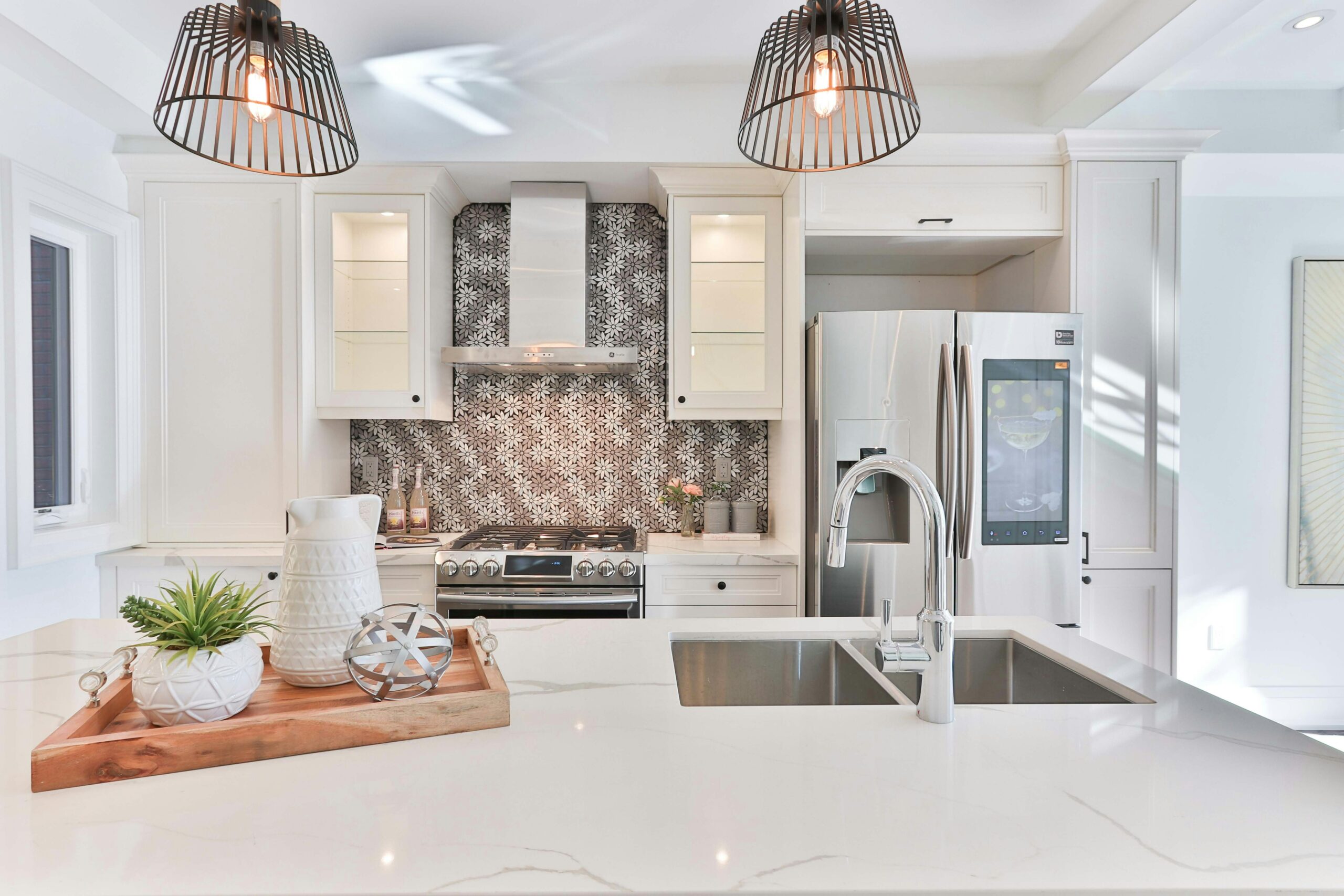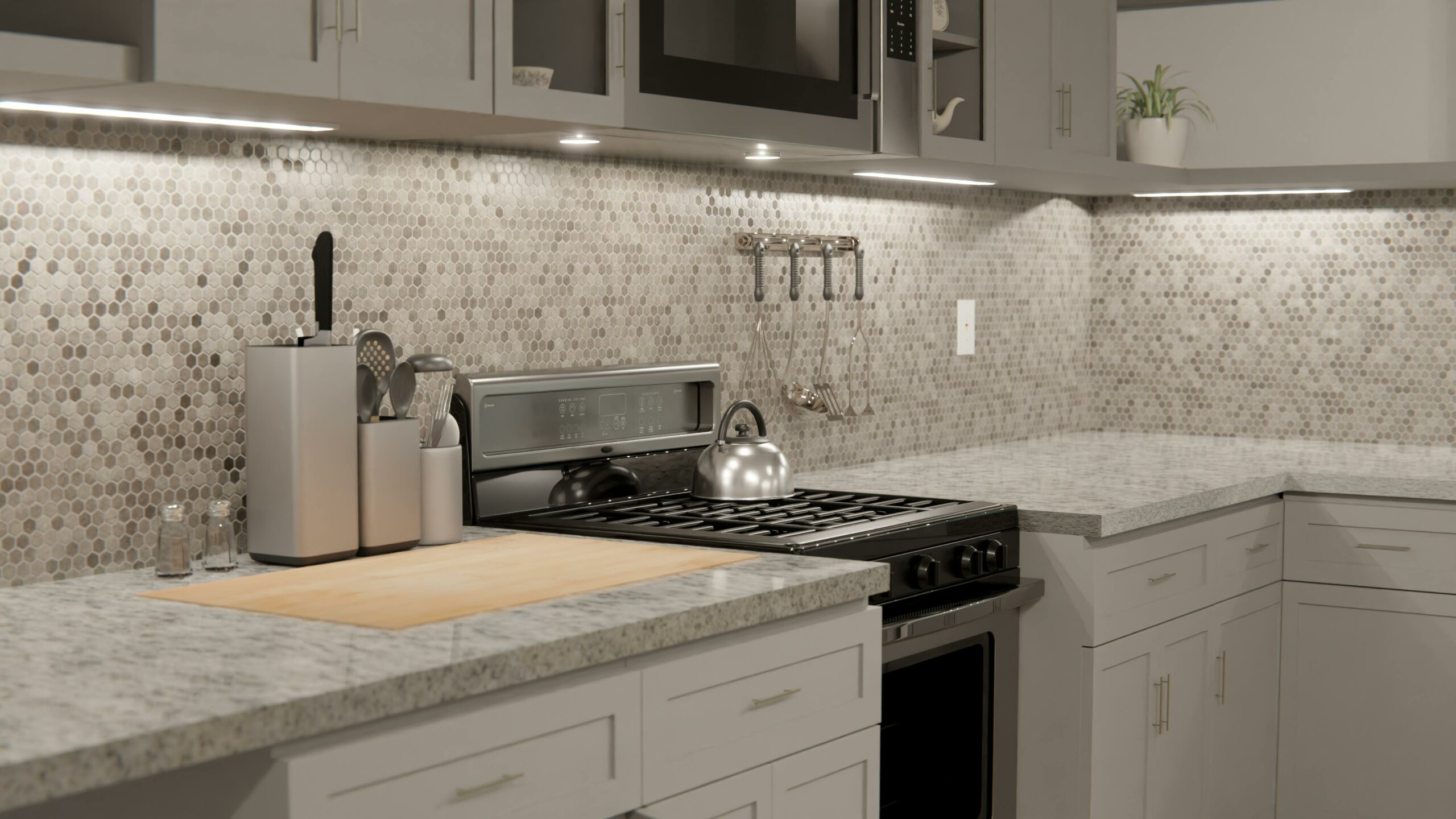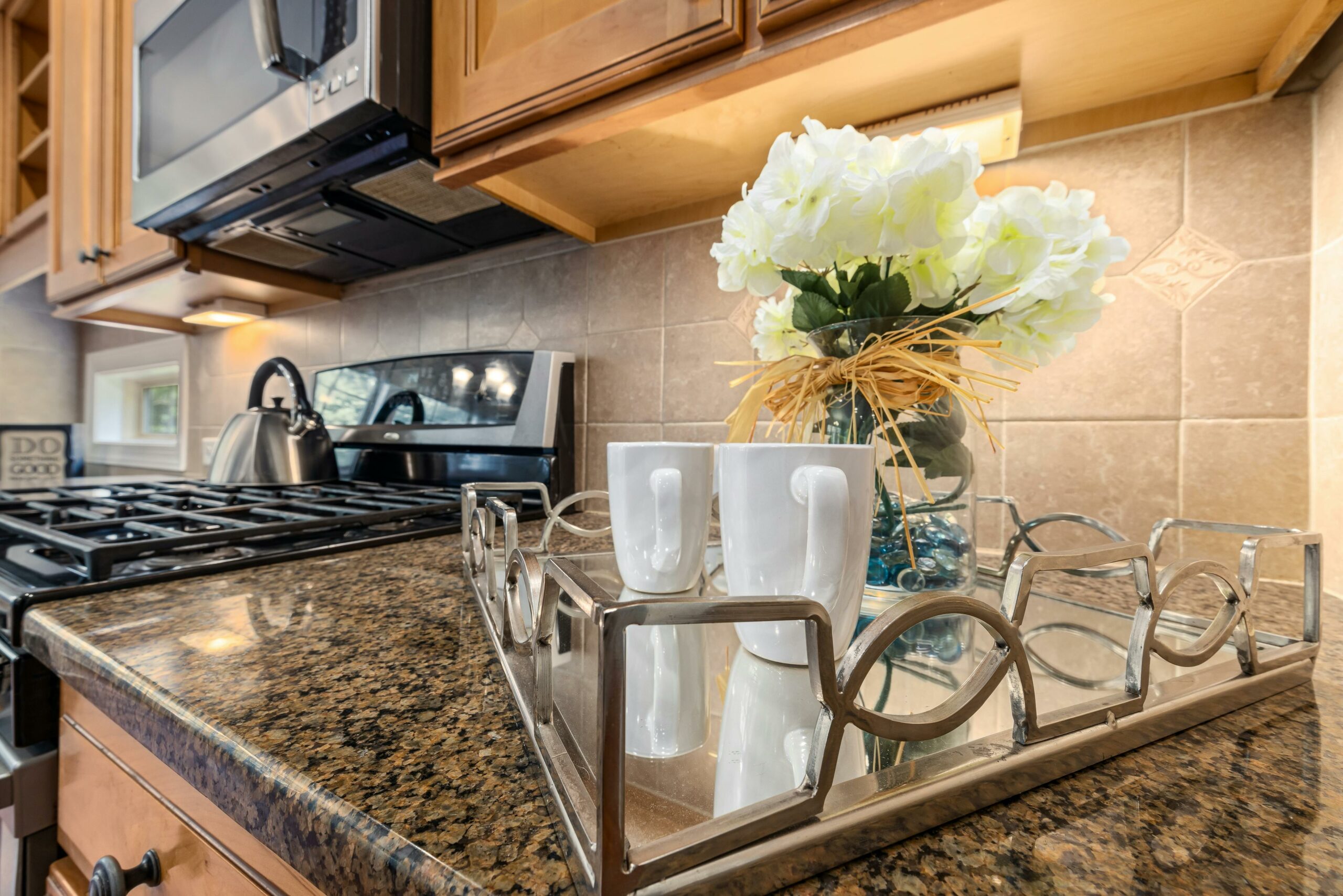Marble Countertops have long been regarded as one of the best choices for home decoration. Offering a seamless blend of aesthetics, durability, and functionality, they stand out as an exceptional choice, particularly for elegant kitchen design. Whether you are considering a kitchen remodel, evaluating various countertop materials, or simply curious about this luxurious stone, you’re in the right place.
In the forthcoming sections, we will explore the durability of marble countertops and unravel why they remain a favorite in the world of interior design. We’ll also provide practical maintenance tips to keep your countertop looking pristine for years to come. Our deep dive into the pros and cons will help you make an informed decision, unmasking the true beauty of these countertops.
Our cost evaluation will give you a clear understanding of what to expect financially and how to plan for this worthwhile investment. For the meticulous homeowner, we’ll also share effective cleaning and protection techniques that can be easily implemented. Of course, no stone, no matter how exquisite, comes without its unique characteristics. We’ll detail the different types of marble countertops so that you can find your perfect match.
Are you a DIY enthusiast? We’ll guide you step by step on how to install your marble countertop. Finally, we’ll offer a comparison of marble countertops versus other countertop materials to aid you in making the best choice for your home.
Dive right in and enjoy the journey to finding your ideal marble countertop.
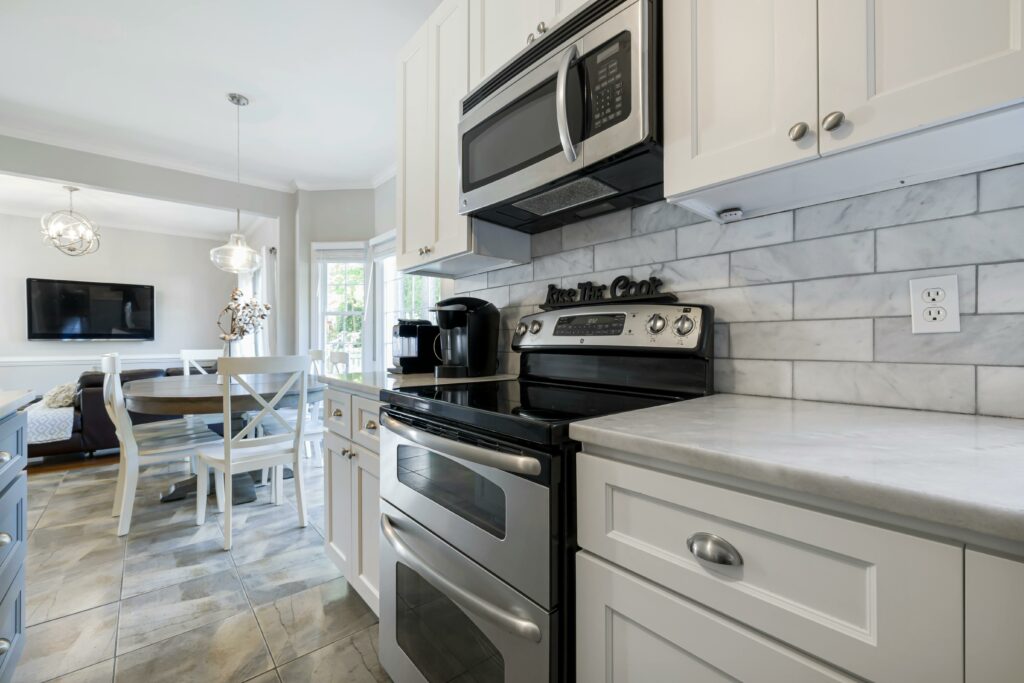
Understanding the Durability of Marble Countertops
Marble countertops are known for their elegance and timeless beauty, but many homeowners wonder about their durability. It’s important to understand the factors that contribute to the durability of marble countertops before making a decision to install them in your kitchen.
Composition of Marble
Marble is a natural stone that is formed from limestone under extreme heat and pressure. It is composed mainly of calcite, which gives it its characteristic veining and patterns. The unique composition of marble contributes to its durability, making it a popular choice for countertops.
Strength and Hardness
Marble is a relatively soft stone compared to other countertop materials such as granite or quartz. It has a rating of 3-4 on the Mohs scale of hardness, which means it is susceptible to scratching and chipping. However, with proper care and maintenance, marble countertops can last for many years.
Sealing and Stain Resistance
One of the key factors in the durability of marble countertops is sealing. Marble is a porous stone, which means it can absorb liquids and stains if not properly sealed. Regular sealing helps to protect the surface of the marble and prevent staining, enhancing its durability.
Heat Resistance
Marble is known for its heat resistance, making it an ideal choice for kitchen countertops. It can withstand high temperatures without being damaged or discolored. However, it’s important to use trivets or hot pads to protect the surface from direct heat exposure.
Impact Resistance
While marble is not as impact-resistant as some other countertop materials, it can still withstand normal wear and tear. However, it is susceptible to cracking or chipping if heavy objects are dropped on it. Taking precautions and avoiding dropping heavy items can help maintain the durability of marble countertops.
Maintenance and Care
Proper maintenance and care play a crucial role in the durability of marble countertops. Regular cleaning with mild soap and water, avoiding abrasive cleaners, and using cutting boards and trivets can help preserve the beauty and longevity of marble countertops.
By understanding the composition, strength, sealing, heat resistance, impact resistance, and maintenance of marble countertops, homeowners can make an informed decision about whether they are the right choice for their kitchen. With proper care, marble countertops can provide a durable and stunning addition to any home.
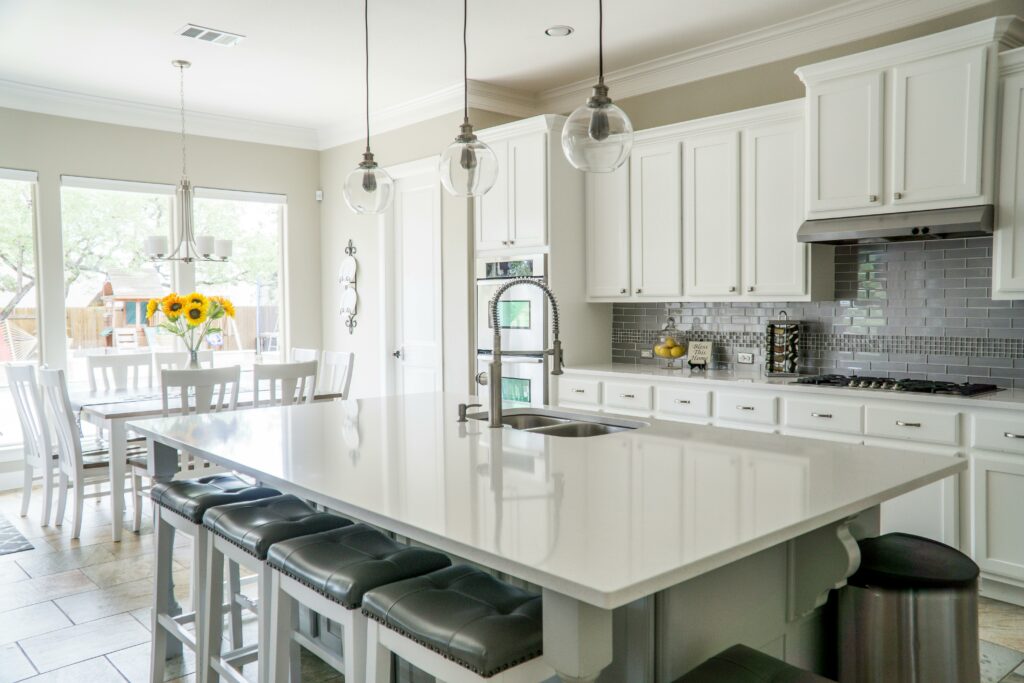
Why Choose Marble Countertops for Your Kitchen
Marble countertops are a popular choice for kitchens due to their unique beauty and timeless elegance. They can instantly elevate the overall look and feel of your kitchen, making it a focal point of your home. But there are more reasons why marble countertops are a great option for your kitchen:
Durability
Marble countertops are known for their durability, making them a long-lasting investment for your kitchen. They are resistant to heat, scratches, and stains, which are common occurrences in a busy kitchen environment. With proper care and maintenance, marble countertops can withstand the test of time.
Easy Maintenance
Maintaining marble countertops is relatively easy compared to other countertop materials. Regular cleaning with mild soap and water is usually sufficient to keep them looking their best. However, it is important to avoid using harsh chemicals or abrasive cleaners that can damage the surface of the marble.
Timeless Beauty
The beauty of marble countertops is unmatched. Their natural veining and unique patterns add a touch of luxury and sophistication to any kitchen. Whether you prefer a classic white marble or a more dramatic black marble, there is a wide range of options to choose from to suit your personal style and kitchen design.
Versatility
Marble countertops are versatile and can complement various kitchen styles, from traditional to modern. They can be paired with different cabinet colors and finishes, allowing you to create a cohesive and visually appealing kitchen space. Marble also works well with different types of sinks and faucets, giving you more flexibility in your kitchen design choices.
Increased Home Value
Investing in marble countertops can increase the value of your home. Potential buyers are often drawn to kitchens with high-quality and luxurious materials, and marble countertops are a desirable feature that can make your home stand out in the real estate market. It is a worthwhile investment that can pay off in the long run.
Overall, choosing marble countertops for your kitchen is a decision that combines both aesthetics and practicality. With their durability, easy maintenance, timeless beauty, versatility, and potential for increasing home value, marble countertops are an excellent choice for any kitchen.
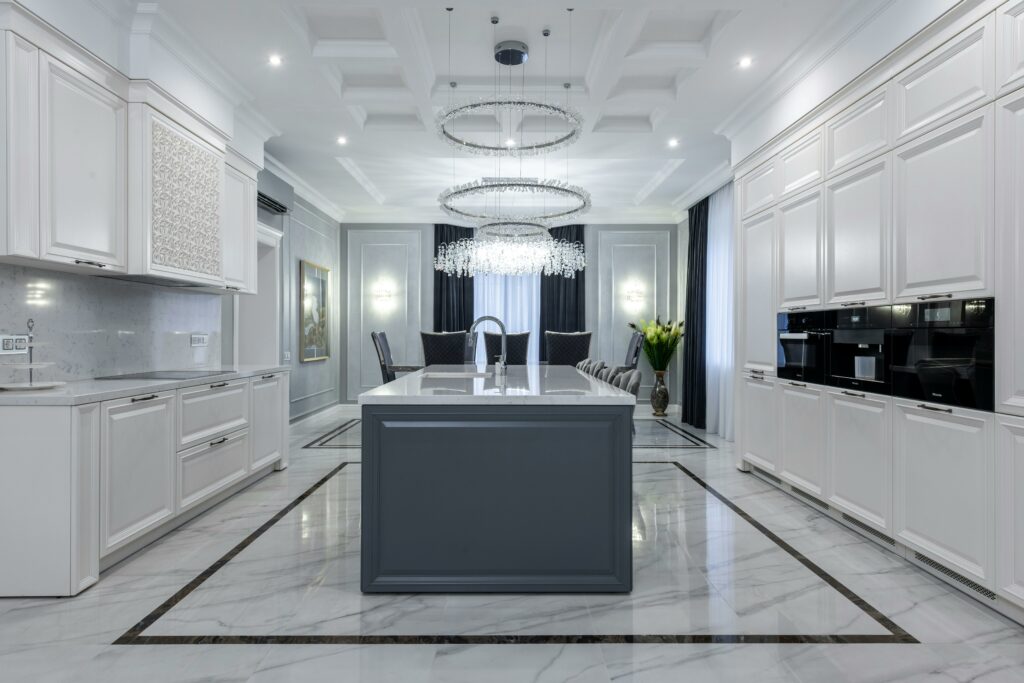
Maintenance Tips for Your Marble Countertop
Marble countertops can add elegance and sophistication to any kitchen or bathroom. However, they require proper care and maintenance to keep them looking their best. Here are some essential maintenance tips to help you preserve the beauty of your marble countertop:
1. Clean Spills Immediately
Marble is a porous stone, which means it can easily absorb liquids and stains. To prevent permanent damage, it’s crucial to clean up spills as soon as they occur. Use a soft cloth or sponge and a mild, pH-neutral cleaner to gently wipe away the spill. Avoid using abrasive cleaners or scrub brushes, as they can scratch the surface of the marble.
2. Use Cutting Boards and Trivets
Marble countertops are susceptible to scratches and heat damage. To protect the surface, always use cutting boards when chopping or slicing food. Additionally, use trivets or hot pads when placing hot pots, pans, or dishes on the countertop to prevent heat marks.
3. Avoid Harsh Chemicals
When cleaning your marble countertop, avoid using harsh chemicals such as bleach, vinegar, or ammonia-based cleaners. These substances can etch the surface of the marble and cause discoloration. Instead, opt for gentle, marble-specific cleaners or make a homemade solution using warm water and a few drops of mild dish soap.
4. Seal the Marble Regularly
Sealing your marble countertop is essential to protect it from stains and damage. Apply a high-quality marble sealer every 6 to 12 months, or as recommended by the manufacturer. The sealer creates a protective barrier that repels liquids and prevents them from penetrating the stone.
5. Avoid Heavy Impact
Marble is a relatively soft stone and can be prone to chipping or cracking if subjected to heavy impact. To prevent damage, avoid dropping heavy objects onto the countertop and be cautious when moving or placing heavy items on the surface.
6. Regularly Dust and Wipe Down
Dust and debris can accumulate on the surface of your marble countertop, dulling its shine. To keep it looking pristine, regularly dust the surface with a soft cloth or microfiber duster. Additionally, wipe down the countertop with a damp cloth to remove any dirt or grime.
By following these maintenance tips, you can ensure that your marble countertop remains beautiful and in excellent condition for years to come.
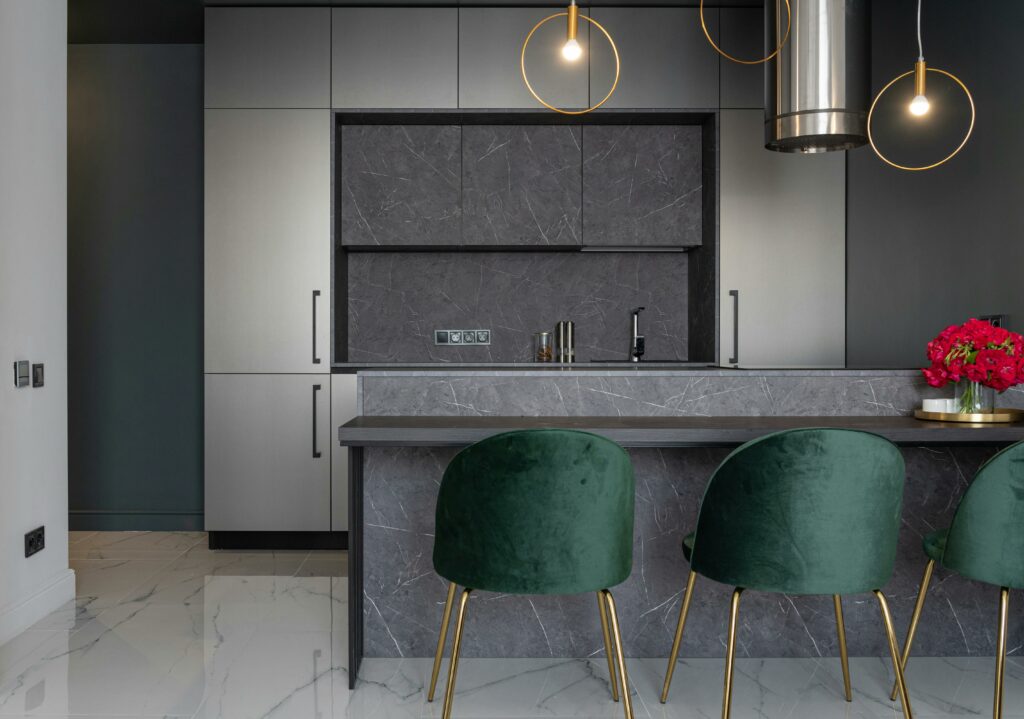
Pros and Cons of Choosing Marble Countertops
Marble countertops are a popular choice for many homeowners due to their elegant and timeless appeal. However, like any other material, marble countertops have their pros and cons that should be considered before making a final decision.
Pros of Choosing Marble Countertops
-
- 1. Aesthetics: Marble countertops are known for their natural beauty and unique veining patterns. They can instantly elevate the look of any kitchen or bathroom, adding a touch of luxury and sophistication.
-
- 2. Heat Resistance: Marble is a heat-resistant material, making it ideal for kitchen countertops. You can place hot pans and pots directly on the surface without worrying about damage.
-
- 3. Durability: When properly sealed and maintained, marble countertops can last for many years. They are resistant to scratches and stains, making them a durable choice for busy kitchens.
-
- 4. Value: Marble countertops can increase the value of your home. They are considered a high-end material and can be a selling point if you decide to put your property on the market.
Cons of Choosing Marble Countertops
-
- 1. Porosity: Marble is a porous material, which means it can absorb liquids and stains if not properly sealed. It requires regular sealing to prevent any damage or discoloration.
-
- 2. Maintenance: Marble countertops require regular maintenance to keep them looking their best. They need to be cleaned with mild soap and water and should never be cleaned with abrasive cleaners.
-
- 3. Susceptible to Scratches: While marble is durable, it is not as resistant to scratches as other countertop materials like quartz or granite. Care should be taken to avoid dragging heavy objects across the surface.
-
- 4. Cost: Marble countertops can be quite expensive compared to other materials. The cost of installation and maintenance should be taken into consideration when budgeting for your kitchen or bathroom renovation.
Ultimately, the decision to choose marble countertops comes down to personal preference and lifestyle. If you are willing to invest in regular maintenance and appreciate the natural beauty of marble, it can be a stunning addition to your home. However, if you are looking for a low-maintenance option or have a limited budget, you may want to explore alternative countertop materials.
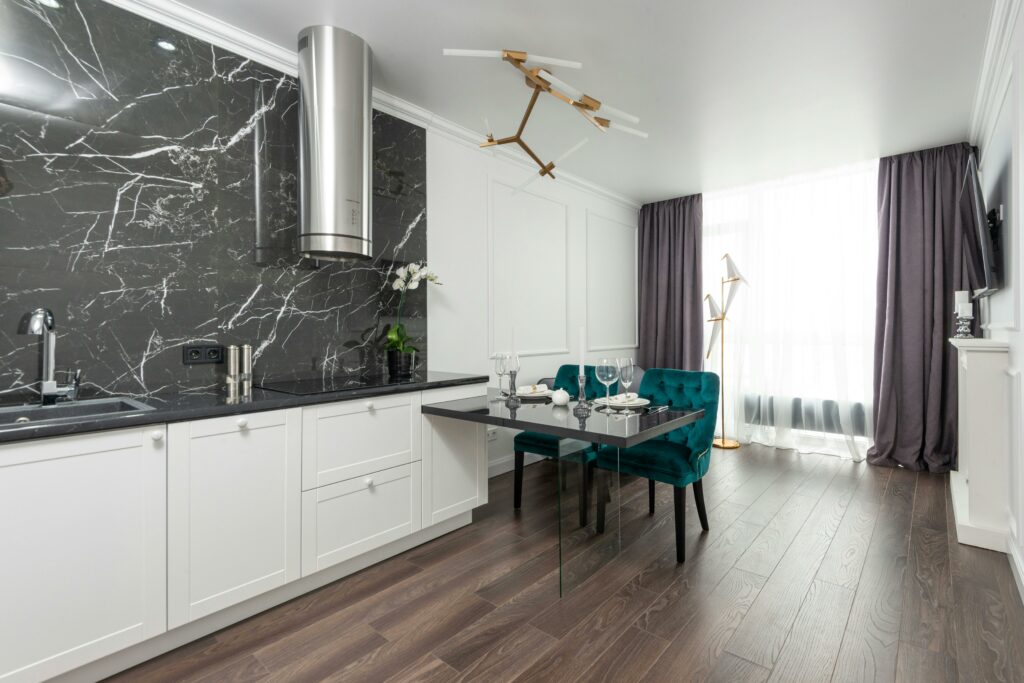
The Beauty of Marble Countertops
Marble countertops are not only known for their durability and functionality, but also for their stunning beauty. The natural elegance and timeless appeal of marble make it a popular choice for homeowners looking to enhance the aesthetic appeal of their kitchen or bathroom.
Elegant and Luxurious
Marble countertops exude a sense of elegance and luxury that is unmatched by any other countertop material. The unique veining and patterns found in marble create a visually striking and sophisticated look, adding a touch of class to any space.
Wide Range of Colors and Varieties
Marble comes in a wide variety of colors, ranging from classic white and gray to more exotic options like green, pink, and black. This extensive range of colors allows homeowners to choose a marble countertop that perfectly complements their existing decor or serves as a focal point in the room.
Natural Beauty and Character
One of the most appealing aspects of marble countertops is their natural beauty and character. Each slab of marble is unique, with its own distinct veining and patterns, making every countertop a one-of-a-kind piece of art. The natural variations in color and texture add depth and interest to the overall design.
Timeless Appeal
Marble has been used in architecture and design for centuries, and its timeless appeal continues to endure. Choosing marble countertops ensures that your kitchen or bathroom will never go out of style, as marble is a classic and enduring choice that transcends trends and fads.
Enhances the Value of Your Home
Investing in marble countertops can significantly enhance the value of your home. The luxurious and high-end appeal of marble is highly sought after by homebuyers, making it a wise investment that can yield a higher return when it comes time to sell your property.
Overall, the beauty of marble countertops lies in their elegant and luxurious appearance, wide range of colors and varieties, natural beauty and character, timeless appeal, and ability to enhance the value of your home. If you are looking to add a touch of sophistication and elegance to your kitchen or bathroom, marble countertops are an excellent choice.
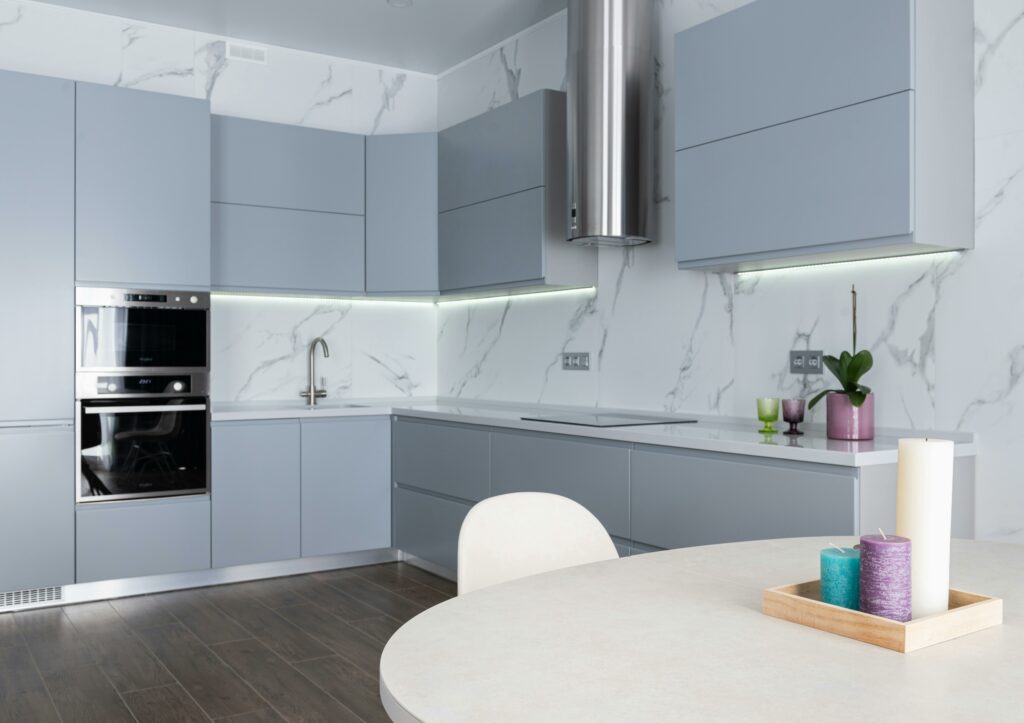
Cost Evaluation of Marble Countertops
When considering marble countertops for your kitchen or bathroom, it’s essential to evaluate the cost involved. Marble countertops can be a significant investment, and understanding the factors that affect their cost can help you make an informed decision.
1. Material Cost
The cost of marble countertops primarily depends on the type and quality of marble you choose. Different types of marble have varying price ranges, with rare and exotic marbles being more expensive. Additionally, the quality and grade of the marble can influence the cost.
2. Size and Thickness
The size and thickness of the marble slab needed for your countertops will also impact the cost. Larger countertops will require more material, resulting in higher costs. Similarly, thicker slabs of marble will be more expensive than thinner ones.
3. Installation Expenses
The cost of installing marble countertops includes labor charges, transportation, and any additional materials required for installation. Complex installations or custom designs may incur higher installation expenses.
4. Edge Profiles and Finishes
The choice of edge profiles and finishes for your marble countertops can also affect the overall cost. Intricate edge profiles and specialized finishes may require additional labor and expertise, increasing the cost.
5. Maintenance and Longevity
While not directly related to the initial cost, considering the long-term maintenance and longevity of marble countertops is crucial. Marble requires regular sealing and proper care to maintain its beauty and durability. Factoring in the cost of maintenance and potential repairs over time is essential.
6. Comparison with Other Countertop Materials
Lastly, it’s essential to compare the cost of marble countertops with other popular countertop materials, such as granite, quartz, or laminate. Each material has its own price range and benefits, and evaluating their cost-effectiveness can help you make a well-informed decision.
In conclusion, evaluating the cost of marble countertops involves considering the material cost, size and thickness, installation expenses, edge profiles and finishes, maintenance requirements, and comparing with other countertop materials. By carefully considering these factors, you can determine the overall cost and make a decision that aligns with your budget and preferences.
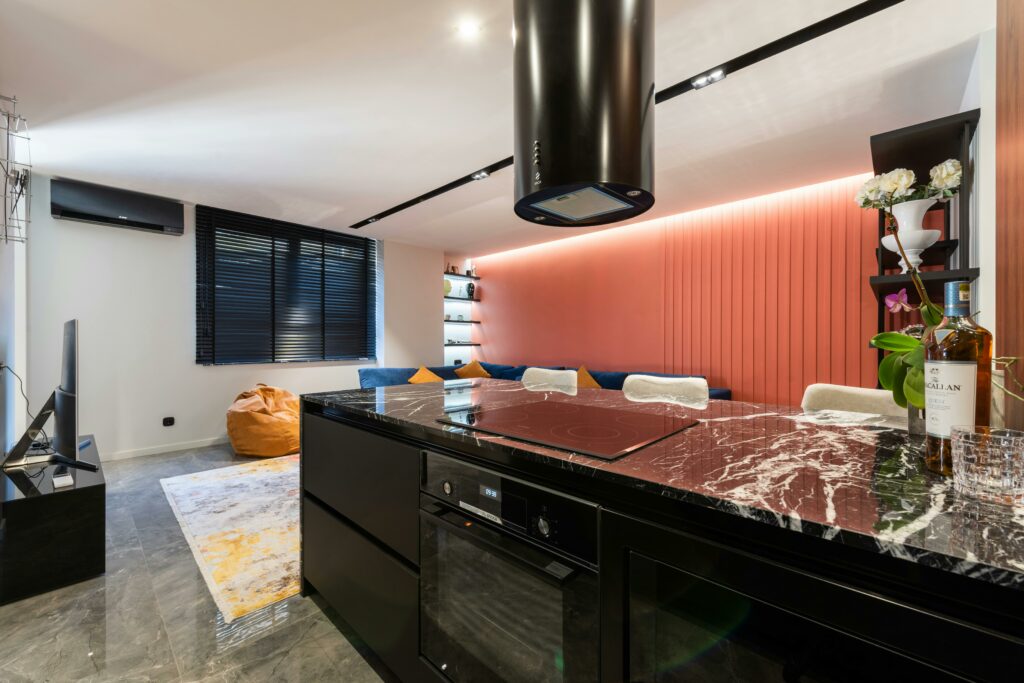
How to Clean and Protect Your Marble Countertop
Marble countertops add a touch of elegance and sophistication to any kitchen. However, they require proper cleaning and maintenance to keep them looking their best. Here are some tips on how to clean and protect your marble countertop:
1. Use Gentle Cleaning Solutions
When cleaning your marble countertop, avoid using harsh chemicals or abrasive cleaners. These can damage the surface and cause etching or staining. Instead, opt for gentle cleaning solutions such as mild dish soap mixed with warm water or a pH-neutral stone cleaner specifically designed for marble.
2. Wipe Spills Immediately
Marble is porous and can easily absorb liquids, leading to stains. To prevent this, always wipe up spills immediately using a soft, absorbent cloth. Avoid rubbing the spill, as this can spread the liquid and potentially damage the surface. Instead, blot the area gently until it is dry.
3. Avoid Using Acidic Cleaners
Acidic cleaners, such as vinegar or lemon juice, can etch the surface of your marble countertop, leaving dull spots or marks. It’s best to avoid using these types of cleaners altogether. If you need to remove stubborn stains, consult a professional or use a marble-specific stain remover.
4. Use Cutting Boards and Trivets
Marble is susceptible to scratches and heat damage. To protect your countertop, always use cutting boards when preparing food and trivets or hot pads when placing hot pots or pans on the surface. This will prevent scratches and heat marks from forming.
5. Seal Your Marble Countertop
To enhance the durability and longevity of your marble countertop, it’s crucial to seal it regularly. Sealing helps to protect the surface from stains and moisture penetration. Consult the manufacturer’s guidelines or seek professional advice on the best sealing products and frequency for your specific marble countertop.
6. Regularly Clean and Polish
In addition to regular cleaning, it’s essential to polish your marble countertop to maintain its shine and luster. Use a marble-specific polish or a microfiber cloth to gently buff the surface in circular motions. This will help to remove any smudges or fingerprints and restore the natural beauty of your countertop.
By following these cleaning and maintenance tips, you can keep your marble countertop looking stunning for years to come. Remember to be gentle, avoid harsh chemicals, and take proactive steps to protect the surface from stains and damage.
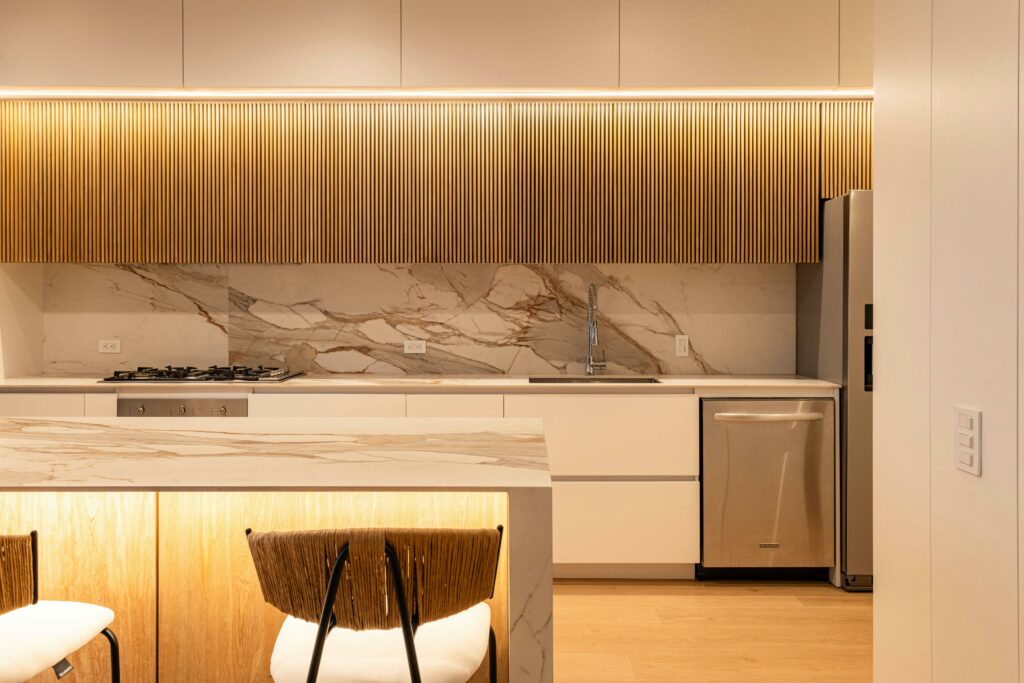
Various Types of Marble Countertops
Marble countertops come in a variety of types, each with its own unique characteristics and aesthetic appeal. Here are some of the most popular types of marble countertops:
Carrara Marble
Carrara marble is one of the most well-known types of marble. It is characterized by its white background and gray veining, which gives it a classic and elegant look. Carrara marble is often used in kitchens and bathrooms due to its timeless beauty.
Calacatta Marble
Calacatta marble is known for its luxurious and dramatic appearance. It features a white background with bold, thick veins in shades of gray and gold. Calacatta marble is highly sought after for its striking beauty and is often used in high-end residential and commercial projects.
Statuario Marble
Statuario marble is prized for its pure white color and dramatic veining. The veins in Statuario marble are typically thick and bold, ranging in color from gray to gold. This type of marble is often used in high-end applications, such as luxury kitchens and bathrooms.
Emperador Marble
Emperador marble is characterized by its rich brown color and intricate veining. It is available in different shades, including light, medium, and dark brown. Emperador marble adds warmth and sophistication to any space and is often used in both traditional and contemporary designs.
Crema Marfil Marble
Crema Marfil marble is known for its creamy beige color and subtle veining. It has a soft and elegant appearance, making it a popular choice for both residential and commercial applications. Crema Marfil marble is versatile and can complement a wide range of design styles.
Verde Guatemala Marble
Verde Guatemala marble is a unique type of marble that features a green background with white and gray veining. It is a striking and vibrant choice for countertops, adding a pop of color to any space. Verde Guatemala marble is often used in modern and contemporary designs.
Nero Marquina Marble
Nero Marquina marble is a black marble with white veining, creating a bold and dramatic look. It is a popular choice for creating a statement piece in kitchens and bathrooms. Nero Marquina marble adds a touch of sophistication and elegance to any space.
These are just a few examples of the various types of marble countertops available. When choosing a marble countertop, it’s important to consider the color, veining, and overall aesthetic to ensure it complements your space and design vision.
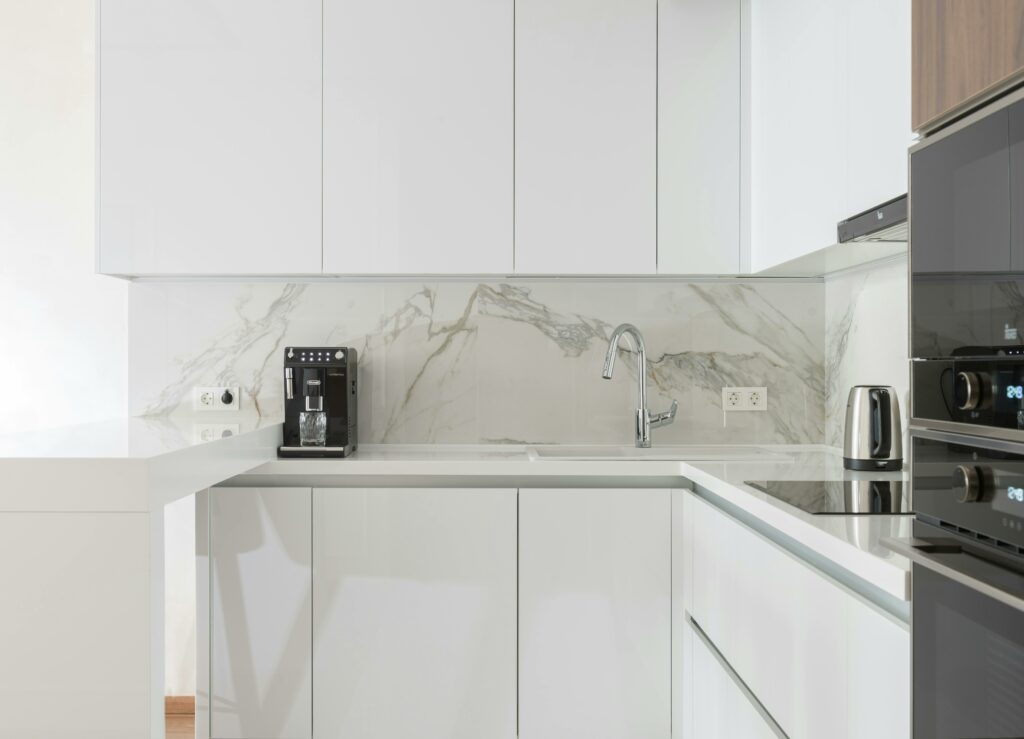
How to Install a Marble Countertop
Installing a marble countertop can add a touch of elegance and sophistication to your kitchen or bathroom. However, it is important to follow the proper installation process to ensure a seamless and durable result. Here are the steps to install a marble countertop:
1. Measure and Prepare
Before you begin the installation process, measure the dimensions of your countertop area and purchase the appropriate amount of marble slabs. Make sure to account for any cutouts for sinks or appliances.
2. Prepare the Substrate
Ensure that the substrate, which is the surface that the marble will be installed on, is clean and level. Remove any existing countertops and thoroughly clean the area. If necessary, use a leveling compound to even out any uneven spots.
3. Apply Adhesive
Apply a thin layer of adhesive to the substrate using a notched trowel. Make sure to spread the adhesive evenly to ensure proper adhesion.
4. Place the Marble Slabs
Carefully place the marble slabs onto the adhesive, starting from one end of the countertop and working your way to the other end. Use a rubber mallet to gently tap the slabs into place, ensuring they are level and secure.
5. Secure the Slabs
Once all the slabs are in place, use clamps or temporary supports to hold them in position while the adhesive dries. Follow the manufacturer’s instructions for the drying time of the adhesive.
6. Seal the Seams
If there are any visible seams between the marble slabs, use a color-matched epoxy or adhesive to fill them in. Smooth out the seams with a putty knife and wipe away any excess adhesive.
7. Apply a Sealant
To protect your marble countertop from stains and damage, apply a sealant. Follow the manufacturer’s instructions for the specific sealant you are using, and make sure to apply it evenly and thoroughly.
8. Clean and Maintain
After the sealant has dried, clean your marble countertop regularly with a mild soap and water solution. Avoid using abrasive cleaners or scrub brushes that can scratch the surface. Additionally, reapply the sealant as recommended to maintain the protection of your marble countertop.
By following these steps, you can successfully install a marble countertop and enjoy its beauty and durability for years to come.
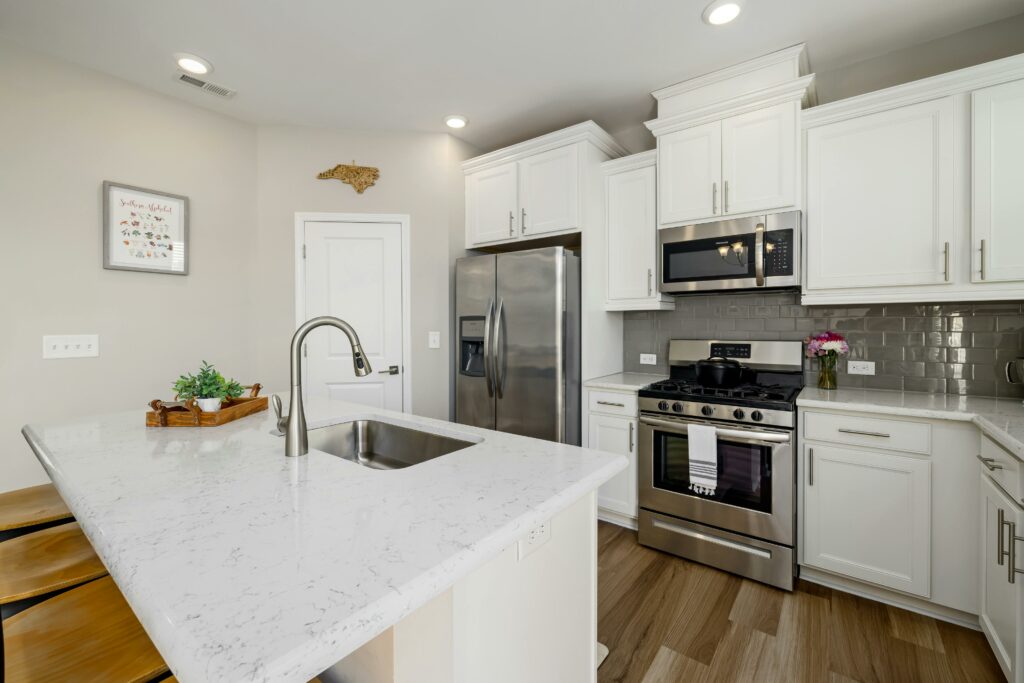
Marble Countertops Versus Other Countertop Materials
When it comes to choosing the perfect countertop material for your kitchen or bathroom, you have a wide range of options to consider. One popular choice that stands out is marble countertops. However, it’s important to weigh the pros and cons of marble countertops against other materials to make an informed decision.
1. Granite Countertops
Granite is another natural stone that is often compared to marble when it comes to countertops. Both materials offer a luxurious and elegant look, but there are some key differences to consider. Granite is known for its durability and resistance to heat and scratches. It also comes in a wide variety of colors and patterns, making it a versatile choice for any kitchen or bathroom.
2. Quartz Countertops
Quartz countertops have gained popularity in recent years due to their durability and low maintenance. Unlike marble, quartz is an engineered stone made from a combination of natural quartz crystals and resin. This makes it highly resistant to stains, scratches, and heat. Quartz countertops also come in a wide range of colors and patterns, allowing you to find the perfect match for your design aesthetic.
3. Laminate Countertops
Laminate countertops are a budget-friendly option that offers a wide range of colors and patterns. They are made by layering a thin sheet of plastic onto a particleboard or plywood base. While laminate countertops are not as durable or heat-resistant as marble, they are easy to clean and maintain. However, they may not offer the same level of elegance and luxury as marble or other natural stone materials.
4. Solid Surface Countertops
Solid surface countertops, such as Corian, are made from a combination of acrylic, polyester, and other materials. They offer a seamless and non-porous surface that is resistant to stains and scratches. Solid surface countertops are available in a wide range of colors and patterns, allowing for endless design possibilities. However, they may not have the same natural beauty and uniqueness as marble.
5. Butcher Block Countertops
Butcher block countertops are made from thick strips of wood that are glued together to create a sturdy and durable surface. They offer a warm and natural look that adds character to any kitchen. While butcher block countertops require regular maintenance and can be susceptible to water damage and scratches, they can be sanded and refinished to restore their original beauty.
6. Stainless Steel Countertops
Stainless steel countertops are a popular choice in commercial kitchens due to their durability and resistance to heat, stains, and bacteria. They offer a sleek and modern look that can complement any kitchen design. However, they can be prone to scratches and fingerprints, requiring regular cleaning and maintenance to keep them looking their best.
When comparing marble countertops to other materials, it’s important to consider factors such as durability, maintenance, aesthetics, and budget. Each material has its own unique qualities and advantages, so it’s essential to choose the one that best fits your needs and personal preferences.

